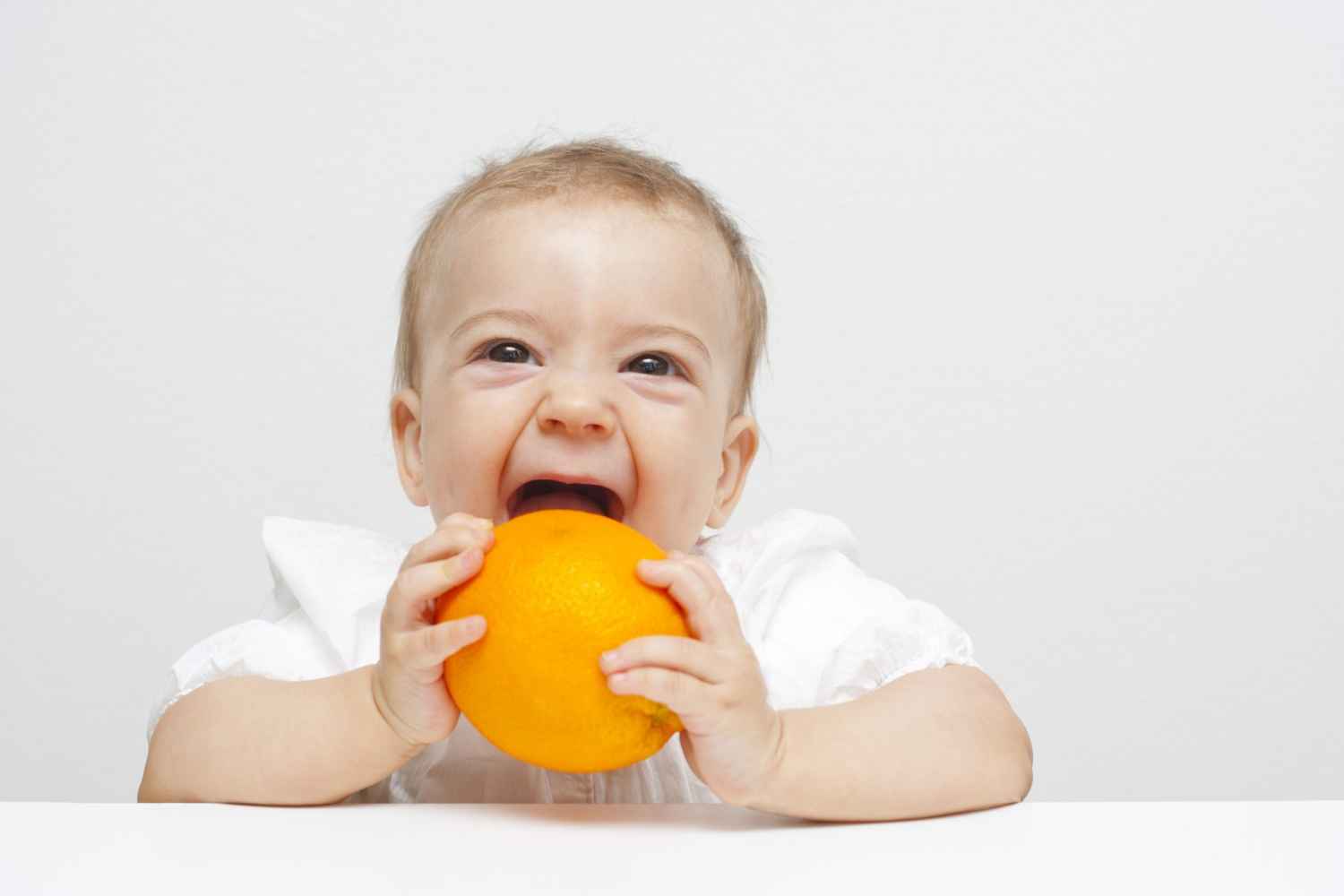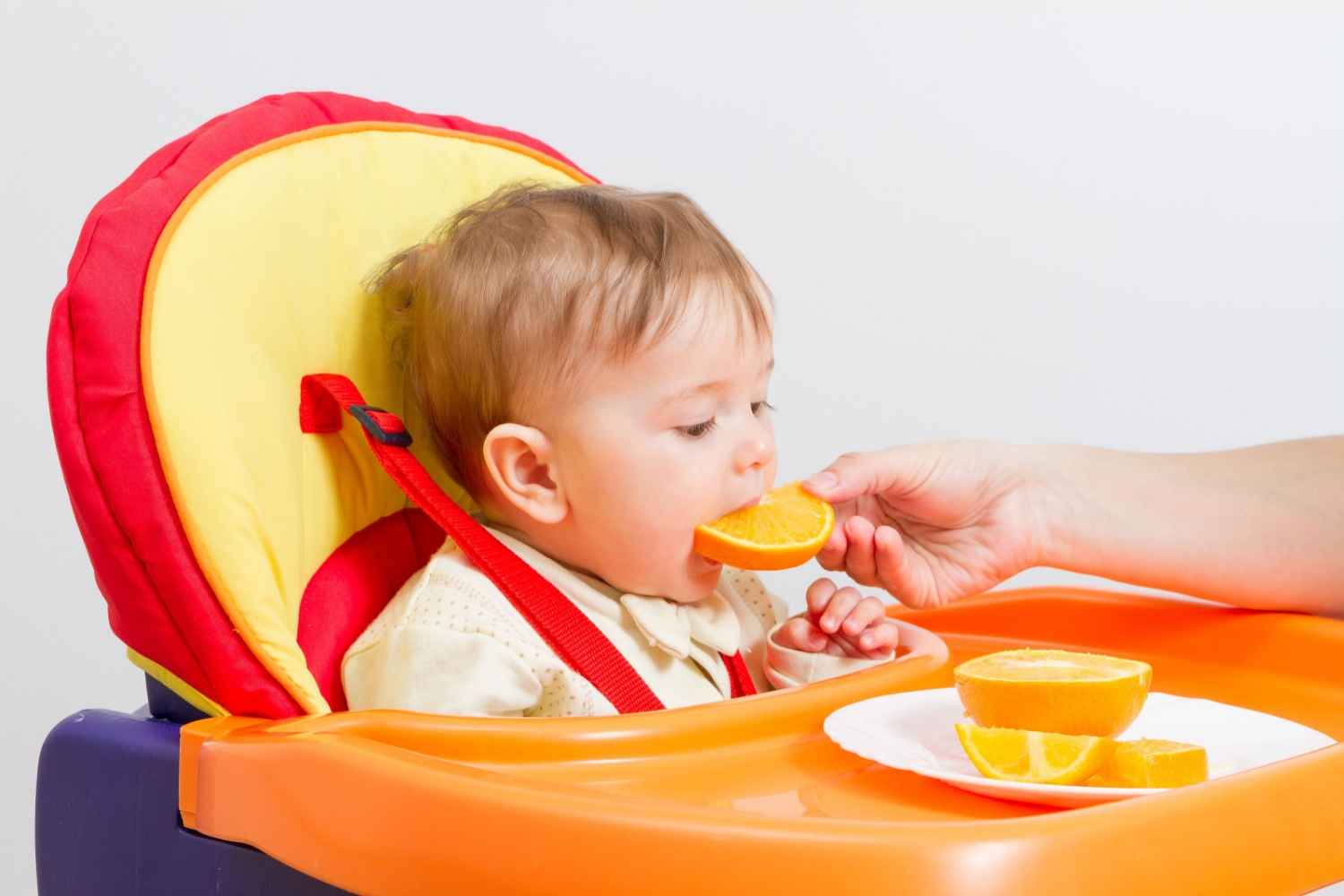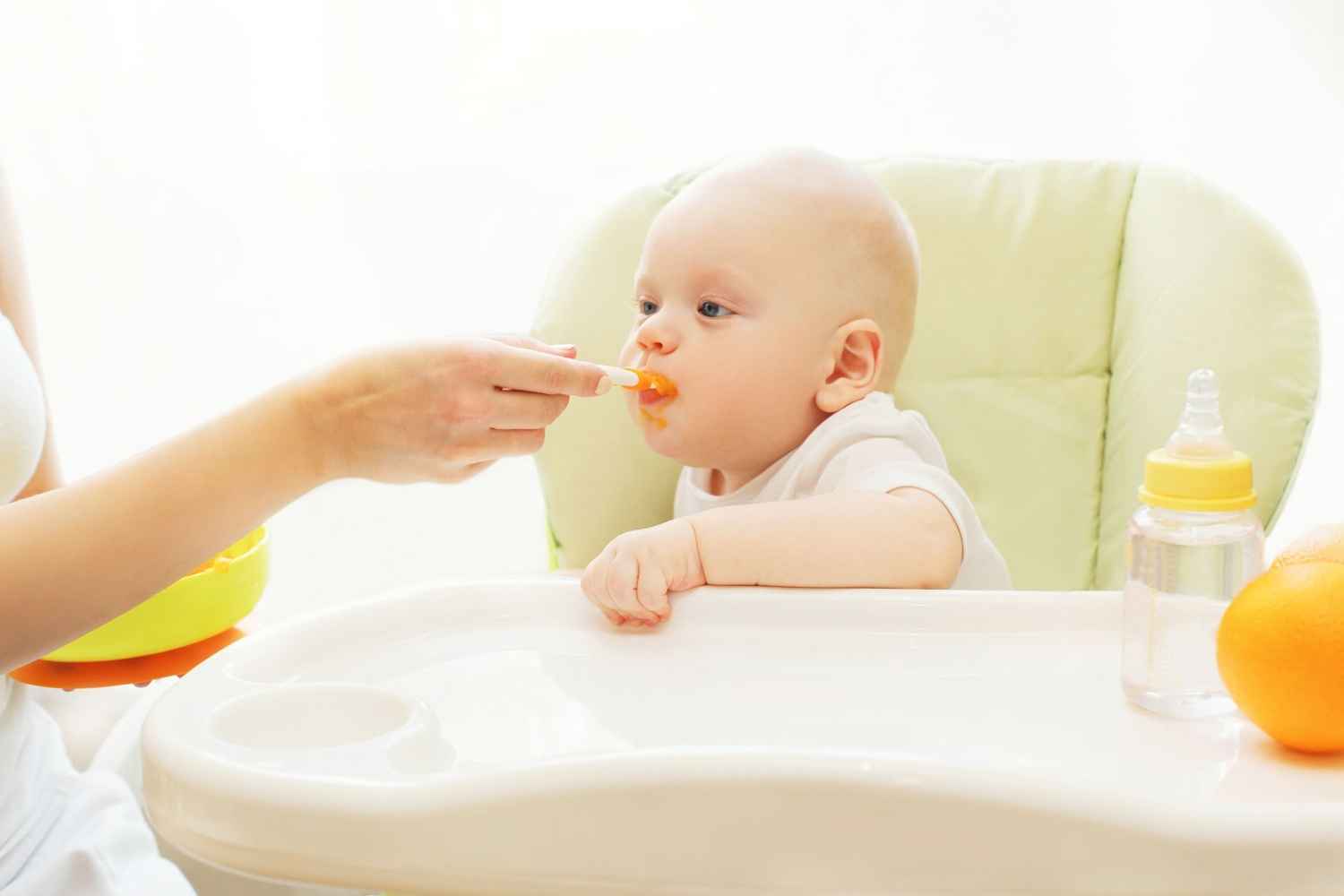
For the first six months of his life, breastmilk provides all the vital nutrients to your baby. As your baby grows, you should progressively start introducing him to semi-solids and a wide variety of fruits, vegetables, grains, and other food groups. Each food group and individual food provides a different source of nutrition for babies. Hence it is important to introduce as many foods as possible. When introducing oranges for babies, parents may worry whether it is safe and if their baby can digest it.
Oranges are an amazing choice among a variety of colourful fruits. These fruit are high in vitamins and minerals, that will benefit your baby’s health. However, you may have a lot of apprehensions regarding this fruit – when to begin feeding your baby oranges? Its benefits and so forth. Given below are all the crucial facts that you ever need to know about oranges and the wonderful benefits of this tangy fruit.
In This Article
- When Can You Introduce Oranges To Babies?
- Nutritional Value Of Orange
- 7 Wonderful Benefits Of Oranges For Babies
- Side Effects of Oranges For Babies
- Precautions While Feeding Oranges To Babies
- What Is The Best Way Of Serving Oranges For Babies?
- Simple Orange Recipes For Babies
- FAQ’s
When Can You Introduce Oranges To Babies?
You can safely begin feeding oranges to your little one as they reach one year. It is usually safe to do so between the ages of 8 and 12 months when they begin eating solid foods. This is because of the acidic nature of this citrus fruit that may cause intolerance in the little one if introduced earlier. It can even trigger rashes in an earlier stage and can be quite sensitive to the little one’s tummy. However, not all babies are sensitive to oranges so always check your pediatrician and/or dietitian before introducing new foods.
Nutritional Value of Orange (Per 100 Grams)

Oranges are an excellent source of hydration with high levels of water present in them. Additionally, they are high in Vitamin C, minerals such as calcium and potassium and fiber. Here is the nutritional value of oranges per 100 gm of the fruit (1).
- Water – 86.7 g
- Carbohydrate – 11.8 g
- Fiber – 2 g
- Sugars – 8.57 g
- Calcium – 43 mg
- Magnesium – 10.7 mg
- Phosphorus – 23 mg
- Potassium -166 mg
- Vitamin C – 59.1 mg
- Folate – 25 µg
7 Wonderful Benefits Of Oranges For Babies

Loaded with umpteen vitamins and minerals apart from Vitamin C, oranges are a healthy option for your baby. Oranges are also high in dietary fiber that promote digestive health.
Some of the benefits of oranges for babies include
1. Relief From Constipation
Babies routinely suffer from constipation due to their still-developing digestive system. Foods high in fiber may help regulate the digestion process and regulate constipation (2). Pulpy oranges are a wonderful solution to this issue as oranges have a high fiber content. Mixing freshly squeezed orange juice with water is also found to be quite a good cure for diarrhea.
2. Improves Digestion
Oranges are excellent in improving the digestive function of your little one. Intake of this fruit may help prevent dyspepsia and indigestion in babies. It also keeps their bowel movements regular.
3. Rich in Nutrients
As mentioned above oranges are packed with all good nutrients and minerals vital for the healthy growth of your baby (3). They help to ensure your little one gets all the necessary nutrients that are especially needed for that first year of growth and development.
4. Aids in Nutrient Absorption
Oranges are robust in vitamin C, which helps the body absorb iron from plant-based diets more effectively (4). Getting enough iron is especially important for babies who are introduced to complementary feeding after 6 months of exclusive breastfeeding (5).
5. Hydration Benefits
Oranges, with their high water content, are ideal for keeping newborns hydrated. It not only quenches thirst but also contains vital minerals and vitamins, which can lower the possibility of dehydration and adverse effects.
6. Antioxidant Richness
Oranges are high in antioxidants, especially Vitamin C, which naturally protects infant cells and boosts the immune system (6). It also contains potassium (7) which promotes cardiovascular well-being by regulating blood pressure and supporting a healthy heartbeat (7A).
7. May Help With UTI
Urinary tract infection, or UTI, is a common problem that primarily affects infants (8). UTI, as the name implies, is a disorder that causes discomfort while peeing as well as pain in the lower abdomen. The presence of potassium in it aids in the prevention of UTIs and improves the functioning of the kidneys and bladder.
Side Effects of Oranges For Babies

Oranges are an easy and healthy snack for babies since they have a sweet flavor that they cherish. Their antioxidant, anti-inflammatory, and immune-boosting properties have been associated with health benefits, like reducing the length of a cold.
Stay watchful and cautious to ensure that your infant gets the benefits of oranges without discomfort. If your baby is allergic to other citrus foods, watch for symptoms. Overindulging in oranges can lead to common side effects in babies (9).
- Skin Reactions: Excessive orange consumption might cause skin rashes, itching, and slight swelling of the lips and gums.
- Respiratory Symptoms: Eating too many oranges may result in a runny nose, sneezing, and throat irritation.
- Digestive Distress: Excess orange consumption can cause stomach aches, acidity, and even vomiting in some babies.
Keep a watch out for symptoms and, if you notice any, get immediate medical care to find out whether avoiding citrus is required.
Precautions While Feeding Oranges To Babies

Given below are some of the precautions that need to be observed before feeding oranges to the little one.
1. Fiber, Peel And Seeds
Oranges need to be washed and peeled well. Also, ensure you take out the seeds and the fiber around the flesh of the orange as this may cause discomfort to your little one and babies can choke on the small seeds present in oranges.
2. Sweetness
Make sure the orange you plan to feed is sweet in flavor. Babies do not like the sour taste and may refuse to eat oranges that have even a mild sour taste.
3. Freshness
Strictly feed only fresh and juicy oranges as stale ones can trigger indigestion and other related issues. Never offer an orange with soft marks to the baby.
4. Avoid Readymade Orange Juice Or Pulp
You will find commercially prepared orange juice or orange pulp at supermarkets and other grocery stores. However, it is best to avoid feeding your little one this and stick to homemade freshly squeezed juice or pulp.
Additional points to be considered
- Start with tiny bits of orange to observe any side effects.
- When testing for food sensitivity, no other foods should be combined.
- Avoid feeding unripe or freshly picked oranges to the baby.
- Monitor your infant for any adverse reactions.
- Remember to follow the three-day rule when introducing oranges to your baby.
What Is The Best Way Of Serving Oranges For Babies?

There are many ways of serving oranges to your little one. Some of them are
- You can peel, deseed, and cut it into small slices and feed it to the little one directly.
- Take off the membrane and then offer the pulp to the baby.
- You can also mash up the juicy fruit and feed the orange pulp to your baby, which becomes easier for them to eat if they are reluctant to chew.
- You can also offer freshly squeezed orange juice and if needed, dilute with a little water and feed your baby with this juice. Remember not to add sugar to the juice.
- Always offer the sweeter oranges first to develop the taste.
- Never leave the juice for a few hours and then offer, fresh juices should be consumed instantly.
Simple Orange Recipes For Babies
Oranges can be offered to the baby in umpteen ways. Apart from giving it all by itself, as a fruit, or by taking fresh juice, it can even be mixed with other foods such as avocados, blueberries, peaches, sweet potato, milk, cranberry, yogurt, etc.
Some tongue-ticking recipes that can be made with oranges that the baby will surely relish are stated as under:
1. Orange Yogurt Pops
Puree a peeled and deseeded orange and add a cup of yogurt to it. Transfer the concoction to ice trays and leave till they freeze. You can offer these pops during summers or when your babies are teething.
2. Orange Juicy Carrots
Add 1 cup water, quarter of a cup of orange juice and a half pound of peeled and diced carrots to a pan. Steam till soft. Feed as is or mash and feed if needed. You can optionally add a pinch of cinnamon.
3. Orange Banana Mash
Add a tbsp olive oil to a pan and let it warm up. Add a sliced banana and sauté it. To this, add 4 tbsp orange juice and 2 tbsp apple juice. Keep stirring for a while. Mash everything well and feed.
4. Orange Dal
Cook dal as you would normally cook. Now add orange juice to this and stir well. Mash in a blender. Serve as is or with rice.
5. Carrot Orange Puree Baby Food
Cook half a cup of peeled and chopped carrots till they become tender. Add a tbsp orange juice as well as cinnamon powder. Now blend it well.
Orange can be eaten as fruit, juiced, or pureed with carrots and other exotic fruits, as well as in yogurt. Oranges can even be blended; whatever is given to the infant, it is always enjoyed by the baby, but as parents, we must exercise caution and keep an eye out for any adverse effects. Oranges pair well with blueberries, avocados, cranberries, peaches, sweet potato, yogurt, and chicken. You can look up on the internet and try out various healthy and nutritious recipes to serve your little darling.
[Read: Is It Okay To Give Yogurt To Baby When They Have A Cold?]
FAQ’s
1. Are Oranges Safe For Babies?
Yes, it is safe to offer oranges to babies. There are numerous ways to feed oranges to babies, including feeding them whole (pulp), juicing, and as jams and jellies. Oranges are rich in vitamin C and folate as well as fiber and carbs, They provide energy for babies while helping improve their immunity.
2. Is Orange Puree Good For Babies?
Yes, freshly prepared orange puree is good for babies, especially for babies eating oranges for the first time. Babies will find it easy to gulp the fibrous pulp and eat. Later
3. Can I Feed Orange to my 9 Month Old Baby?
Yes, a 9-month-old baby can be fed deseeded, juicy orange segments. As they grow, they will attempt to chew the orange piece, which will serve as a tether for them.
References
- FoodData Central – [https://fdc.nal.usda.gov/food-details/746771/nutrients]
- What Do We Know about Dietary Fiber Intake in Children and Health? The Effects of Fiber Intake on Constipation, Obesity, and Diabetes in Children – PMC – [https://www.ncbi.nlm.nih.gov/pmc/articles/PMC3262613/]
- Agriculture | Free Full-Text | Potential Nutritional Benefits of Current Citrus Consumption – [https://www.mdpi.com/2077-0472/3/1/170]
- Interaction of vitamin C and iron – PubMed – [https://pubmed.ncbi.nlm.nih.gov/6940487/]
- Daily iron supplementation in children 6-23 months of age – [https://www.who.int/tools/elena/interventions/iron-children-6to23]
- Nutritional benefits of oranges | SpringerLink – [https://link.springer.com/chapter/10.3920/978-90-8686-739-4_29]
- Potassium – Health Professional Fact Sheet – [https://ods.od.nih.gov/factsheets/Potassium-HealthProfessional/]
- Diagnosis and Treatment of Urinary Tract Infections in Children | AAFP – [https://www.aafp.org/pubs/afp/issues/2011/0215/p409.html]
- Allergies in children – PMC – [https://www.ncbi.nlm.nih.gov/pmc/articles/PMC2805592/]

